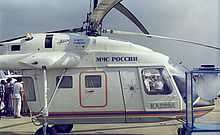Kamov Ka-126
The Kamov Ka-126 (NATO reporting name Hoodlum) is a Soviet light utility helicopter with co-axial rotors. Evolved from Ka-26 with engine pods removed from stub wings, fitted with one TVO-100 turboshaft engine positioned on top of fuselage, modified rotor blades, new fuel system.
Development
Development began 1984 with the signing of governmental Romanian-Soviet agreement in the field of aeronautical construction for cooperation in manufacturing a utility helicopter derived from Kamov Ka-26 helicopter.In October 1985 the signing of the collaboration protocol for the manufacturing of the single engine turbine powered KA 126 helicopter. In 1986 Industria Aeronautică Română(IAR) starts the helicopter manufacturing preparation. Early mockup had two small turboshafts above cabin; single turboshaft adopted subsequently; ground test vehicle completed early 1986; In 22 December 1988 was maiden flight of the IAR Built Ka 126 with TV100 engine produced by Turbomecanica București and VR126 main gear built by I. Avioane Bacau today Aerostar. After building 17 Ka 126 production was stopped and after 1991 the program was cancelled.
- Proposed Ka-128, differing only in power plant and addition of an intermediate gearbox, has been abandoned.
- A twin engine variant was developed as the Ka-226.
All the Ka-26/126/128/226 variants are codenamed "Hoodlum".
Design

The fuselage of the Ka-126 consists of a fixed, bubble-shaped cockpit containing the pilot and co-pilot, plus a removable, variable box available in medevac, passenger-carrying and cropduster versions. The helicopter can fly with or without the box attached, giving it much flexibility in use. Compared with Ka-26 has turboshaft engine, significant increase in payload/endurance/range, and greater year-round utilisation; updated equipment includes new low-volume spraygear. Contrarotating coaxial three-blade rotors; hinge rotor head with 'rake'-type blade attachment. Load-carrying rear section and electrothermal anti-icing; rotor brake standard; non-folding blades. Three-stage gearbox with planetary gear trains, of alloy steel and aluminium casting, flange mounted with four load-carrying bolts. Accessories include cooling fan, hydraulic pump and AC generator; engine input 6,000rpm. Non-retractable four-wheel type landing gear. Main units, at rear, carried by stub-wings. All four units embody oleo-pneumatic shock-absorber. Forward wheels of castoring type, self-centring, no brakes. Rear wheels have pneumatic brakes. Mainwheel tyres size 595 x 185 mm, pressure 2.45 bars; forward wheel tyres size 300 x 125 mm, pressure 3.43 bars. Skis optional. Provision for large inflatable pontoons, across front of aircraft forward of front wheels and under each mainwheel.
POWER PLANT: One 522 kW Mars (Omsk) TV-O-100 turboshaft, installed centrally in streamline fairing above cabin. Electronic-hydraulic automatic two-channel control system, with manual control in case of electronic governor failure. Front driveshaft with plate coupling to gearbox. Fuel in two forward and one aft tank, total capacity 800 litres. Provision for two external tanks, on sides of fuselage, total capacity 320 litres. Single-point main tank refuelling, on port side of aft tank.
ACCOMMODATION: Fully enclosed cabin, with rearward-sliding door each side; normal operation by single pilot; second seat and dual controls optional. Cabin ventilated, and warmed and demisted by air from combustion heater, which also heats passenger cabin when fitted. Air filter on nose of agricultural version. Space aft of cabin, between main landing gear legs and under transmission, can accommodate variety of interchangeable payloads. Cargo/passenger pod accommodates four or six persons on folding sidewall seats, with provision for seventh passenger beside pilot; two clamshell doors at rear of pod, emergency exit each side and hatch in floor. Ambulance pod accommodates two stretcher patients, two seated casualties and medical attendant. For agricultural work, chemical hopper (capacity 1,000 litres) and dust spreader or spraybars are fitted in this position, on aircraft's CG. Aircraft can also be operated with either an open platform for hauling freight or hook for slinging loads at end of a cable or in a cargo net.
Variants

- Ka-126 Hoodlum-B
- One or two crew utility light helicopter, powered by a 720-shp (537-kW) (Glushenkov) OMKB TVD-100 turboshaft engines. First flown in 1986, and built under licence by IAR in Romania. 2 prototypes and 15 series helicopter built.
- Kamov V-60
- A proposed light armed escort helicopter based on the Ka-126.
- Ka-128
- One prototype, powered by a 722-shp (538-kW) Turbomeca Arriel 1D1 turboshaft engine.
- Kamov Ka-226
- Powered by two 450-shp (335-kW) Rolls-Royce 250-C20R/2 turboshaft engines.
Specifications (Ka-126)
Data from Jane's All The World's Aircraft 1993–94[1]
General characteristics
- Crew: 2
- Capacity: 6 passengers (cargo/passenger pod)
- Payload: 1,000 kg (2,205 lb) (slung load) or 1000 L (220 Imp Gallons) chemical hopper
- Length: 7.775 m (25 ft 6 in)
- Rotor diameter: 13.00 m (42 ft 7¾ in)
- Height: 4.155 m (13 ft 7½ in)
- Disc area: 265.5 m² (2,856 ft²)
- Empty weight: 1,915 kg (4,222 lb)
- Max. takeoff weight: 3,250 kg (7,165 lb)
- Powerplant: 1 × Omsk TVO-100 turboshaft, 522 kW (700 hp)
Performance
- Maximum speed: 180 km/h (97 knots, 112 mph)
- Cruise speed: 160 km/h (86 knots, 99 mph)
- Range: 713 km (384 nmi, 443 mi)
- Endurance: 5 hr 36 min
- Service ceiling: 3,850 m (12,630 ft)
- Rate of climb: 6.6 m/s (1,300 ft/min)
See also
- Related development
- Aircraft of comparable role, configuration and era
References
- ↑ Lambert 1993, pp. 277–278.
- Lambert, Mark. Jane's All The World's Aircraft 1993–94. Coulsdon, UK: Jane's Data Division, 1993. ISBN 0-7106-1066-1.
- R. Simpson "Airlife's Helicopter and Rotorcraft", 1998
External links
| Wikimedia Commons has media related to Kamov. |
| |||||||||||||||||
| ||||||||||||||